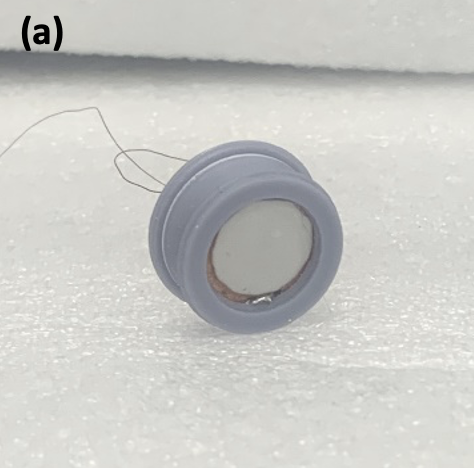Industry engagement and impact
+++
Impact development projects
- Development of an ultrasonic sensor for hydrogen metering applications
Responding to the growing demand for sustainable and low carbon energy solutions, there is now significant focus on exploring the feasibility of domestic hydrogen gas supply, to complement and potentially replace conventional natural gas. To unlock the potential of hydrogen-based solutions, a reliable and economical metering system is necessary to provide reliable and accurate measurements of gas flow rates at various stages in the system.
 |
 |
| a) The prototype piezoelectric ultrasonic sensor for measurement in hydrogen |
b) Laboratory sensor characterisation |
This EPSRC IAA, in partnership with MeterTech Ltd, is focusing on the development of a robust and industrially scalable ultrasonic transducer capable of detection in hydrogen. Two transducers are being engineered, one for the generation of ultrasound and the other for detection, thereby providing time-of-flight measurement which will be converted to accurate flow rates. The principal challenge of this project is to overcome the severe acoustic impedance mismatch between piezoelectric ceramics and hydrogen gas, which results in significant levels of signal loss in operation. Current research is actively investigating and developing novel transducer materials to overcome this challenge, with material selection guided by simulation prior to laboratory based experimental characterisations. Upon completion of these experiments, these novel sensors will be subjected to industrial trials with MeterTech Ltd.
-
SUERC research will aid preparations for safe long-term disposal of radioactive waste
Researchers from SUERC have been awarded £290k from Nuclear Waste Services (NWS) to investigate the safe, long-term disposal of UK radioactive waste.
The projects (IT4SG and CLIME) are led by Prof. Fin Stuart and Dr Kieran Tierney respectively. They will focus on key aspects that are critical to the long-term safety of a Geological Disposal Facility (GDF); characterising the origin and age of the groundwater in the potential GDF sites and determining the extent that the marine environment will change over their operational lifespan.
Isotope Toolkit for Saline Groundwaters - IT4SG
Characterising the groundwater currently present at the two candidate sites is vital to understanding the processes that will govern the sub-surface environment housing the GDF.
Both sites currently under consideration for the GDF contain old and highly saline groundwaters. Understanding the groundwater history is critical for assessing the risks associated with each site.
SUERC has a unique suite of chemical and isotopic analytical techniques that will be used to determine the number of groundwater components, their source and age. The project will, for the first time, bring together new and existing technology and use them to determine the fresh and saline groundwaters at both sites.
Climate Change Impacts to Marine Ecosystems in UK Regional Seas – CLIME
The potential GDF sites are both offshore and NWS is investing in studies to investigate how the marine environment will change over the 150-year construction and operational lifespan of the GDF.
Climate change will impact the UK marine environment in this timeframe, potentially reshaping ecosystem structure and the species present which must be considered for protection.
Working with partners at Natural England and CEFAS, CLIME will develop new, spatially explicit, dynamic marine ecosystem models that can predict recent changes to the distribution and composition of marine biota.
These models will form the base for forecasting changes over the next century and will incorporate assessments of species that currently have protected status.
About SUERC - CENTRE FOR THE ISOTOPE SCIENCES: The Centre, a joint venture between the University of Glasgow and University of Edinburgh , delivers internationally-leading research, technology innovation, and training across the isotope sciences. Through our critical mass of state-of-the-art instrumentation and highly skilled staff, we provide a focus for world-leading research that tackles strategic research questions in Earth, Environmental, Heritage, and Biomedical Sciences.
---
+++
Spin-out companies
- www.clydehydrogen.com: UofG spinout in the green hydrogen space
- www.aevaspec.com: UofG spinout that develops the next generation of bespoke, compact radiation detectors for applications in oil and gas and nuclear decommissioning
---
+++
PhDs and Fellowships
- Through our competitive engagement in the Energy Technology Partnership’s Energy Industry Doctorate Programme, we have secured support for 20 PhDs. The programme addressed the strategic demands of industry and government for ‘industry-ready’ researchers to enhance energy industry innovation and knowledge exchange effectiveness.

- PhD studentship from the Nuclear Decommissioning Authority, (50% funded by Sellafield Limited)
- In December 2023, two UofG academics were awarded prestigious UKRI Future Leaders Fellowships, for impactful research into nuclear decommissioning, and nuclear arms control and disarmament.
---
+++
Visiting Professors
-
James Yu MBE, FRSE, FIET, PhD, CEng, Head of Innovation at SP Energy Networks, is Visiting Professor in our James Watt School of Engineering, bringing the unique perspectives of distribution and transmission network operators in our work on electricity market, transmission network control, renewable generation and engineering.
---
+++
Donations
- We received a donation of 2000 cores of compute from Ampere Ltd, based on our initial work that demonstrated the ARM computer architecture saved significant energy over x86.
- Petroleum Experts Ltd has donated 10 educational licences of the IPM suite and MOVE software, equivalent to the value of £4,446,137.28, to the University of Glasgow. The software will be used for thesis projects of our MSc in Sustainable Energy and for research in geothermal energy, carbon capture and sequestration, and hydrogen storage.
---
+++
Collaboration with third-party facilities
-
We work closely with state-of-the-art facilities towards the development of industry best practices and to increase the readiness level of energy technologies. We have a close collaboration with TÜV SÜD in East Kilbride, where we design and carry out bespoke tests.
We are partners in the Hydrogen Innovation Centre and testing facility to boost green energy development and lead on experimental research on multiphase flow.
---

